It looks like you're using an Ad Blocker.
Please white-list or disable AboveTopSecret.com in your ad-blocking tool.
Thank you.
Some features of ATS will be disabled while you continue to use an ad-blocker.
share:

Even a world war which claimed as many lives as the last two would not make the world's exploding population manageable, experts warn
A planet-wide conflict that claimed as many lives as the first two world wars combined would hardly make any difference to the world's exploding population, according to a study. Population growth is so out of control that even stringent restrictions on childbirth, disastrous pandemics or a third world war would not make it manageable by the turn of the next century, researchers claim.
Rather than reducing the number of people on the planet, cutting the consumption of natural resources and enhanced recycling would have a better chance of achieving effective sustainability gains in the next 85 years, they said.
I was having my morning coffee and came across this interesting read, The hairs on the back of my neck rose a when I realized that there are people seriously talking about Earth's human population as a real problem and are analyzing ways to either reduce it or bring into some sort of 'manageable' control. This is because some view it as unmanageable or out of control.
Prof Brook, now at the University of Tasmania, said: ''As our models show clearly, while there needs to be more policy discussion on this issue, the current inexorable momentum of the global human population precludes any demographic 'quick fixes' to our sustainability problems.
Are devastating WW-III or Global pandemic scenarios being referred to as simply 'Quick fixes'? I guess it all depends on how one interprets what's being discussed/analyzed here I suppose.
'Quick fixes'?
1.)''Even a worldwide one-child policy like China's, implemented over the coming century, or catastrophic mortality events like global conflict or a disease pandemic, would still likely result in 5-10 billion people by 2100.''
2.) A devastating global pandemic that killed two billion people was only projected to reduce population size to 8.4 billion, while six billion deaths brought it down to 5.1 billion.
3.) The scientists used a computer model based on demographic data from the World Health Organisation and United States Census Bureau to investigate different population reduction scenarios.
I know many will read this article and come away with their own perception but this can be viewed as being something which is possibly much more nefarious in nature.
Thoughts ATS?
What say ye?
edit on 28-10-2014 by SLAYER69 because: (no reason given)
a reply to: SLAYER69
Well, it is a problem, especially if humans continue to eat meat (which, due to the amount of food "livestock" need, is the main cause of deforestation and so much more). Humans have done a swell job of destroying their and earth's natural habitat (humans are the only animal that purposely destroys forests). What to do about the problem? If I ran the world (with Anne Hathaway at my side) Anne and I would make a massive push to change the human diet.
Well, it is a problem, especially if humans continue to eat meat (which, due to the amount of food "livestock" need, is the main cause of deforestation and so much more). Humans have done a swell job of destroying their and earth's natural habitat (humans are the only animal that purposely destroys forests). What to do about the problem? If I ran the world (with Anne Hathaway at my side) Anne and I would make a massive push to change the human diet.
My brain is thinking some clearly disrespectful things on this one but i'll share it anyways as it feels relevant.
Perhaps suicide is a natural population control? Or stupidity.
Many people would die without the medical specialists employed. Or safety features on everything.
Survival of the fittest and all that. Maybe the natural order of things has been convoluted to a point?
War doesn't keep the populations under control,
but rather, regulations on natural occurrences is what allows it to expand.
And now I sound like every terrible sci-fi trope ever.
Perhaps suicide is a natural population control? Or stupidity.
Many people would die without the medical specialists employed. Or safety features on everything.
Survival of the fittest and all that. Maybe the natural order of things has been convoluted to a point?
War doesn't keep the populations under control,
but rather, regulations on natural occurrences is what allows it to expand.
And now I sound like every terrible sci-fi trope ever.
a reply to: SLAYER69
This is an excellent book on this subject. It's not dry reading either, but it is informative.
War! What Is It Good For?: Conflict and the Progress of Civilization from Primates to Robots, by Ian Morris
It really is an eye opener.
This is an excellent book on this subject. It's not dry reading either, but it is informative.
War! What Is It Good For?: Conflict and the Progress of Civilization from Primates to Robots, by Ian Morris
In War! What Is It Good For?, the renowned historian and archaeologist Ian Morris tells the gruesome, gripping story of fifteen thousand years of war, going beyond the battles and brutality to reveal what war has really done to and for the world. Stone Age people lived in small, feuding societies and stood a one-in-ten or even one-in-five chance of dying violently. In the twentieth century, by contrast—despite two world wars, Hiroshima, and the Holocaust—fewer than one person in a hundred died violently. The explanation: War, and war alone, has created bigger, more complex societies, ruled by governments that have stamped out internal violence. Strangely enough, killing has made the world safer, and the safety it has produced has allowed people to make the world richer too.
It really is an eye opener.
I must be careful with my language. I don't want to be banned from the forum again.
There is a pretty specific way babies are made.
There is a pretty specific way to avoid fertilizing female eggs.
A few of them, actually.
Maybe education for the dumb masses is, at least, part of solving the problem.
Maybe "pulling out" could be made popular with the right propaganda.
There is a pretty specific way babies are made.
There is a pretty specific way to avoid fertilizing female eggs.
A few of them, actually.
Maybe education for the dumb masses is, at least, part of solving the problem.
Maybe "pulling out" could be made popular with the right propaganda.
There are some things that can be done and are being done.
China will stabilize her population within about a decade.
Western countries are already just a bit above ZPG and the removal of financial benefits for any more than two children would keep our rates steady.
That leaves India, Africa and South America.
This will not be popular, but if education keeps failing then, let nature take its course. It will any way.
Right now, at this point in time, anything that interferes with the Global production of food, just for two years, will solve the whole problem.
Once there is insufficient food, people will die off rather quickly. It is natures way. I have seen it happen to animal numbers in my own country before protective culling was introduced.
Not nice, but if countries will not enact controls, then mother nature certainly will.
We can only do so much.
Eventually, it will reach a point of no return. Anyone should be able to see that.
P
China will stabilize her population within about a decade.
Western countries are already just a bit above ZPG and the removal of financial benefits for any more than two children would keep our rates steady.
That leaves India, Africa and South America.
This will not be popular, but if education keeps failing then, let nature take its course. It will any way.
Right now, at this point in time, anything that interferes with the Global production of food, just for two years, will solve the whole problem.
Once there is insufficient food, people will die off rather quickly. It is natures way. I have seen it happen to animal numbers in my own country before protective culling was introduced.
Not nice, but if countries will not enact controls, then mother nature certainly will.
We can only do so much.
Eventually, it will reach a point of no return. Anyone should be able to see that.
P
a reply to: SLAYER69
Their calculation is a little abstract.
The casualties of a nuclear war would be much, much heavier than the casualties of the previous wars. Not just the direct effects of the weapons, but also through the effects of the weapons on the planet.
Their calculation is a little abstract.
The casualties of a nuclear war would be much, much heavier than the casualties of the previous wars. Not just the direct effects of the weapons, but also through the effects of the weapons on the planet.
a reply to: SLAYER69
Here's the Amazon link. But I always use the library. Gotta put my tax dollars to work and all that.
www.amazon.com...
Another quote from a review.
Morris is a excellent author in my opinion. He actually makes a serious topic easy, informative and a fun read. All without glossing over the bad parts.
Here's the Amazon link. But I always use the library. Gotta put my tax dollars to work and all that.
www.amazon.com...
Another quote from a review.
Throughout this rare mixture of scholarship, stunning insight, and wit, Morris cites the widely divergent opinions of past philosophers and scholars, and, though he makes his case convincingly, future (and, oh yes, the future is projected) students, readers, and critics of this book are likely to continue the fascinating argument Morris raises here.
Morris is a excellent author in my opinion. He actually makes a serious topic easy, informative and a fun read. All without glossing over the bad parts.
edit on 28-10-2014 by TDawgRex because: (no reason given)
I like Wikipedia its full of graphics World population
Projected world population:

Current fertility rates:
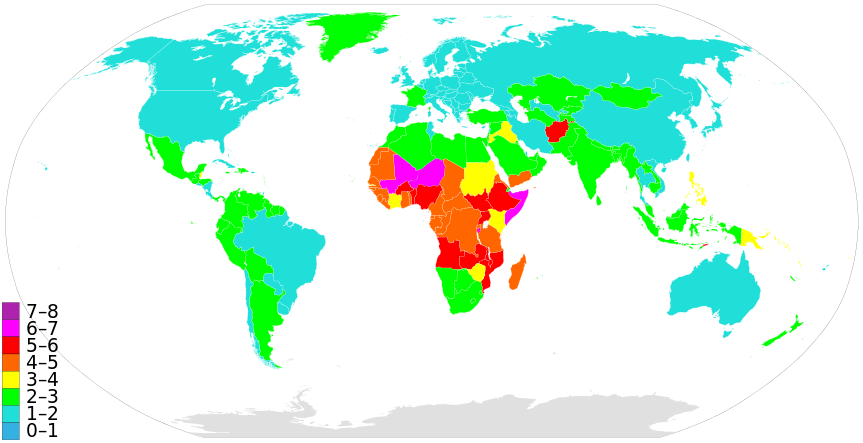
Population by country:
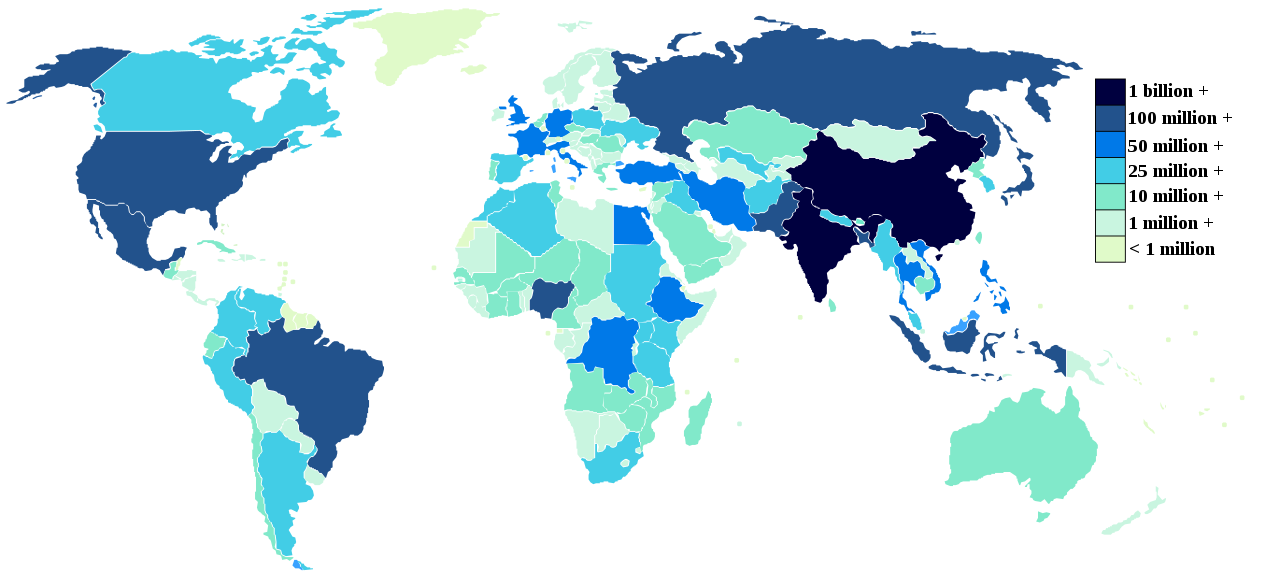
Hey who knew even as Africa mothers have 6+ children they aren't so populated, maybe it has to do with mortality rates too
Death er 1k people:
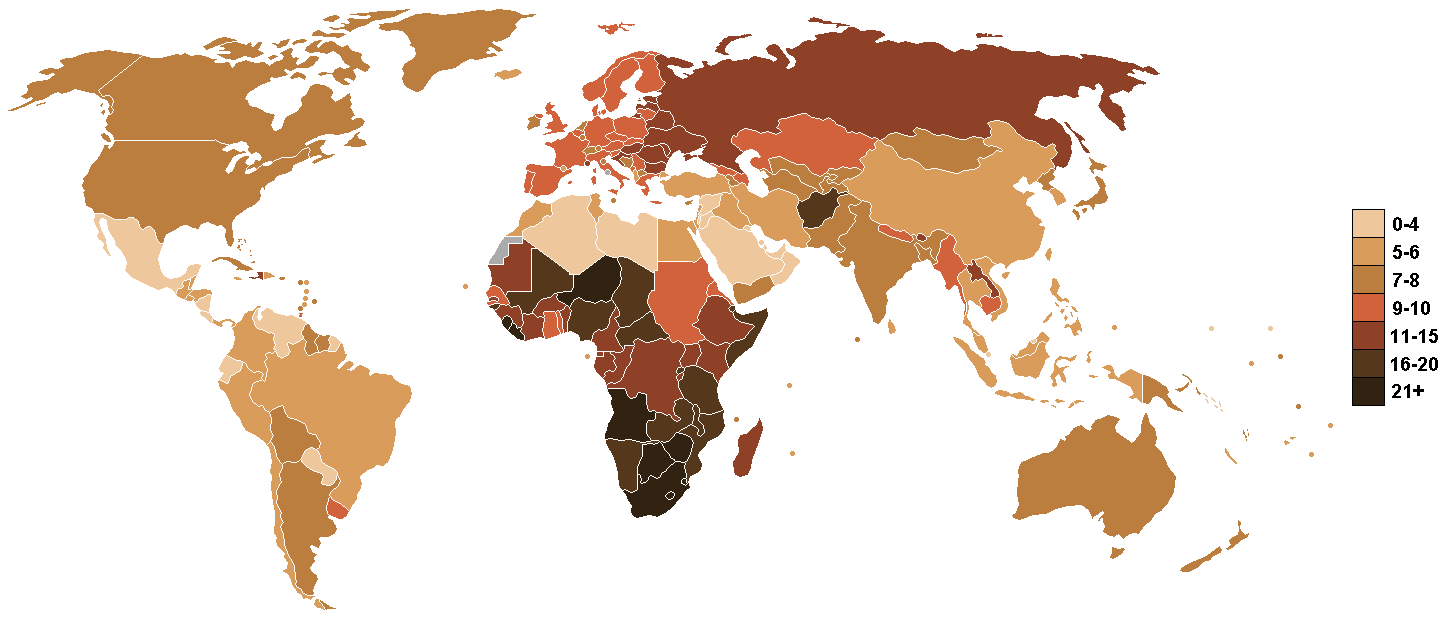
Also humans are not fertile until their death, and world population is actually getting older in the most part of the world
Here is the estimate fertility rates by region:
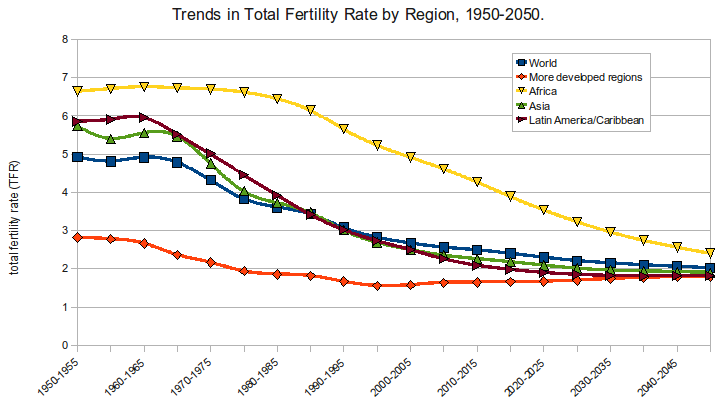
The world is not making babys like before anymore
Years TFR
1950–1955 4.95
1955–1960 4.89
1960–1965 4.91
1965–1970 4.85
1970–1975 4.45
1975–1980 3.84
1980–1985 3.59
1985–1990 3.39
1990–1995 3.04
1995–2000 2.79
2000–2005 2.62
2005–2010 2.52
2010–2015 2.36
When that number is below 2 the population is no longer growing is shrinking, there is no really a population problem you see, back in the day a certain amount of food was produced per distance unit, them so smart people started to make GMO food and the food yield went up
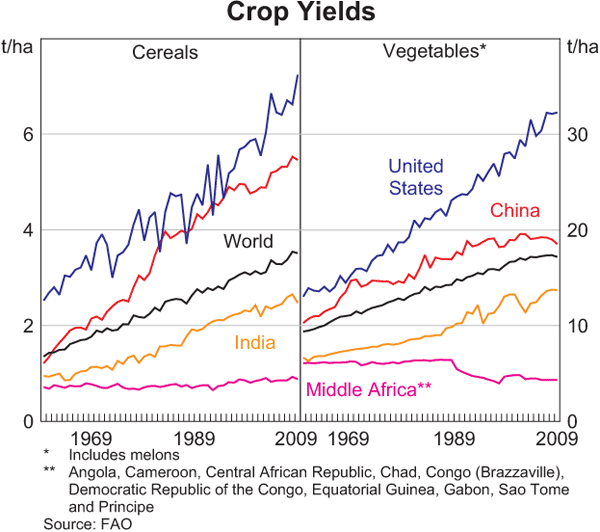
when there is a will there is a way, when current tech reach their limits it does not mean another technology could not be developed.
Japan is making vertical farms now using leds, cyfy of 20 years ago when leds dint really worked until blue ones were made
www.independent.co.uk...
Projected world population:

Current fertility rates:

Population by country:

Hey who knew even as Africa mothers have 6+ children they aren't so populated, maybe it has to do with mortality rates too
Death er 1k people:

Also humans are not fertile until their death, and world population is actually getting older in the most part of the world
Here is the estimate fertility rates by region:

The world is not making babys like before anymore
Years TFR
1950–1955 4.95
1955–1960 4.89
1960–1965 4.91
1965–1970 4.85
1970–1975 4.45
1975–1980 3.84
1980–1985 3.59
1985–1990 3.39
1990–1995 3.04
1995–2000 2.79
2000–2005 2.62
2005–2010 2.52
2010–2015 2.36
When that number is below 2 the population is no longer growing is shrinking, there is no really a population problem you see, back in the day a certain amount of food was produced per distance unit, them so smart people started to make GMO food and the food yield went up

when there is a will there is a way, when current tech reach their limits it does not mean another technology could not be developed.
Japan is making vertical farms now using leds, cyfy of 20 years ago when leds dint really worked until blue ones were made
www.independent.co.uk...
edit on 28-10-2014 by Indigent because: (no reason given)
originally posted by: DISRAELI
a reply to: SLAYER69
Their calculation is a little abstract.
The casualties of a nuclear war would be much, much heavier than the casualties of the previous wars. Not just the direct effects of the weapons, but also through the effects of the weapons on the planet.
I think a Nuclear War is actually along the lines of an "Extinction event" not really a population reduction quick fix scenario, Then again, I guess that would all depend on where and how many nukes get popped.
a reply to: SLAYER69
I certainly wasn't encouraging the idea that world war three should be a "quick fix" scenario.
I was just amazed at the casual assumption that a third war would have such limited casualties. A little disingenuous, really, because the emotional impact which they're aiming for depends on people reading the headline in terms of the real casualties of a third world war.
I certainly wasn't encouraging the idea that world war three should be a "quick fix" scenario.
I was just amazed at the casual assumption that a third war would have such limited casualties. A little disingenuous, really, because the emotional impact which they're aiming for depends on people reading the headline in terms of the real casualties of a third world war.
Most sources I've looked at say the population in 2100 will be about 10 to 12 billion. That is a lot of people and they need water, food, housing,
clothing. Can the Earth sustain such a huge population? Who knows but technology will no doubt have progressed massively by the year 2100 so we can
only imagine what it might be like.
www.washington.edu...
www.theguardian.com...
There is another thing happening. In developed countries the population is actually aging and the birthrate is decreasing. As countries rise in their standard of living the birthrate appears to decrease. I've read a bit about this and evolutionary scientists are at a loss to explain it but there are some theories.
www.theglobalmail.org...
newsfeed.time.com...
Japan has a sharply decreasing birthrate and aging population and if the current trend continues there could be zero babies born in the year 2100.
www.economist.com...
www.washington.edu...
www.theguardian.com...
There is another thing happening. In developed countries the population is actually aging and the birthrate is decreasing. As countries rise in their standard of living the birthrate appears to decrease. I've read a bit about this and evolutionary scientists are at a loss to explain it but there are some theories.
www.theglobalmail.org...
The world's population isn't growing nearly as fast as it once did. In fact, experts say the number of humans could fall within our lifetimes.
newsfeed.time.com...
Japan has a sharply decreasing birthrate and aging population and if the current trend continues there could be zero babies born in the year 2100.
www.economist.com...
edit on 28-10-2014 by JimTSpock because: (no reason given)
looks like an engineered population collapse would be pointless anyway:
sorry to wreck anybody's power-boner. it's space colonization and wise use of resources or bust, kids.
new multi-scenario modelling of world human population has concluded that even stringent fertility restrictions or a catastrophic mass mortality would not bring about large enough change this century to solve issues of global sustainability.
www.sciencedaily.com...
sorry to wreck anybody's power-boner. it's space colonization and wise use of resources or bust, kids.
edit on 28-10-2014 by ATODASO because: (no reason given)
As technology improves, people are going to live longer and longer. So if the population keeps increasing with new babies being born while people
don't die as soon as they used to, yes, the world WILL be having some problems in the future. It's inevitable.
The problem with this topic is that it is a difficult one to approach people with because no one likes to be told they aren't allowed to have children. But if something isn't done, our resource consumption will rise exponentially and the world will become a much worse place to live.
The problem with this topic is that it is a difficult one to approach people with because no one likes to be told they aren't allowed to have children. But if something isn't done, our resource consumption will rise exponentially and the world will become a much worse place to live.
a reply to: yourmaker
i had a talk just like that with an old buddy a few years ago....i came to the conclusion that the human race is the only species not evolving any more.
and what i meant by that was....we protect our dumb and weak to a certain percent which makes us humane...and morally its a good thing, but as a species we are getting weaker...and when resources run out...only the best and brightest and luckiest will survive.
i had a talk just like that with an old buddy a few years ago....i came to the conclusion that the human race is the only species not evolving any more.
and what i meant by that was....we protect our dumb and weak to a certain percent which makes us humane...and morally its a good thing, but as a species we are getting weaker...and when resources run out...only the best and brightest and luckiest will survive.
new topics
-
Let's Buy Greenland
General Chit Chat: 19 minutes ago -
Planned Civil War In Britain May Be Triggered Soon
Social Issues and Civil Unrest: 3 hours ago -
Claim: General Mark Milley Approved Heat and Sound Directed Energy Weapons During 2020 Riots
Whistle Blowers and Leaked Documents: 4 hours ago
top topics
-
Claim: General Mark Milley Approved Heat and Sound Directed Energy Weapons During 2020 Riots
Whistle Blowers and Leaked Documents: 4 hours ago, 8 flags -
Planned Civil War In Britain May Be Triggered Soon
Social Issues and Civil Unrest: 3 hours ago, 4 flags -
Let's Buy Greenland
General Chit Chat: 19 minutes ago, 2 flags
active topics
-
January 6th report shows disturbing trend (nobody is shocked)
US Political Madness • 67 • : JadedGhost -
Remember These Attacks When President Trump 2.0 Retribution-Justice Commences.
2024 Elections • 128 • : Oldcarpy2 -
Meta Llama local AI system is scary good
Science & Technology • 44 • : charlyv -
Claim: General Mark Milley Approved Heat and Sound Directed Energy Weapons During 2020 Riots
Whistle Blowers and Leaked Documents • 19 • : Oldcarpy2 -
Let's Buy Greenland
General Chit Chat • 0 • : CarlLaFong -
SC Jack Smith is Using Subterfuge Tricks with Donald Trumps Upcoming Documents Trial.
Dissecting Disinformation • 144 • : matafuchs -
Let's talk planes.
General Chit Chat • 9 • : LetsGoViking -
Gravitic Propulsion--What IF the US and China Really Have it?
General Conspiracies • 27 • : Lazy88 -
Sorry to disappoint you but...
US Political Madness • 38 • : cherokeetroy -
The Truth about Migrant Crime in Britain.
Social Issues and Civil Unrest • 31 • : gortex
